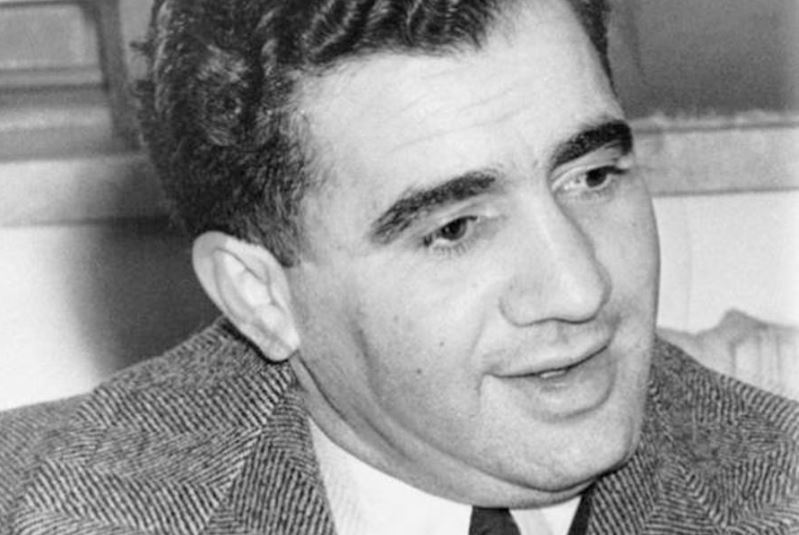There are men you protect out of duty, and men you protect out of principle. Then there was Abe “Kid Twist” Reles—who had to be protected out of necessity, like keeping a rabid dog caged until someone finally put it down.
By the early 1940s, the New York Police Department found itself in the business of babysitting a monster. Not just a run-of-the-mill gangster, but one of the most feared killers of Murder, Inc.—the syndicate’s shadow army of professional executioners. Reles was short, stocky, and perpetually twitching like a rat caught in a trap. His nickname, “Kid Twist,” came from a turn-of-the-century gangster he idolized, but it could just as easily have described his habit of strangling men with rope.
Reles was the kind of man you didn’t invite to dinner, unless you were looking to be poisoned, stabbed, or shot between bites. He confessed to participating in or ordering at least a dozen murders, maybe more. The truth was, no one really knew the body count. But what made him valuable wasn’t the blood on his hands—it was the names on his tongue.
He had turned rat.
And not just any rat. Reles was about to testify against the boss of bosses, Albert Anastasia—the so-called “Mad Hatter” of the underworld, a man who treated life and death like loose change in his pocket. If Reles made it to the stand, Anastasia could be finished. If he didn’t, well, the mob would breathe easy, and so would a lot of cops who secretly thought Anastasia was untouchable anyway.
The assignment to protect Reles fell on a detail of detectives who hated every second of it. Guarding him meant eating with him, sleeping in shifts near him, listening to his gravelly voice spew endless tales of carnage. He bragged about strangling a man with an ice pick handle. About watching the light die in his victims’ eyes. About disposing of bodies like yesterday’s garbage.
“He made you want to take a shower just being in the same room,” one detective later admitted.
But duty is duty. And Reles was a key witness for District Attorney William O’Dwyer, who had staked his political career on breaking Murder, Inc. That meant Reles had to live—at least long enough to point a finger at Anastasia.
The Canary in the Cage
They called him “the Canary.” Not because he sang sweetly, but because once he flipped, he couldn’t stop talking. He sang about Anastasia, about Lepke Buchalter, about Harry “Pittsburgh Phil” Strauss. His words piled up into sworn testimony, case files, indictments. He turned the invisible shadow world of the syndicate into something prosecutors could finally map and attack.
But he also knew the mob’s golden rule: canaries don’t live long.
Every time he opened his mouth, another contract was whispered into the ether. Every time he named a name, he signed his own death warrant.
So the police stationed him at the Half Moon Hotel in Coney Island, a rundown seaside joint chosen because it was away from prying eyes. Six cops rotated shifts, eating stale food and drinking bitter coffee while they kept Reles under watch.
The irony wasn’t lost on them. The same men who once would have given their left arm to collar Reles were now guarding him from the very justice he’d earned. They didn’t trust him. They didn’t like him. Some wondered aloud if maybe it wouldn’t be such a tragedy if the mob got to him first.
But orders were orders. Keep the canary safe.
A Rat Among Wolves
Reles played the role of informant with relish. He strutted around the Half Moon like he was still in charge. He joked, he bragged, he winked at the cops as if they were his new crew. He’d talk about how many ways a man could be killed with an ice pick. How easy it was to make someone vanish in the East River.
The detectives bit their tongues. Protecting him meant listening, even if every word made their stomachs churn.
What haunted them was the knowledge that Reles wasn’t testifying out of remorse. He wasn’t some born-again penitent seeking redemption. He flipped because it was convenient. The heat had been too much. He figured cutting a deal was his best chance to save his own skin.
He wasn’t wrong. Murder, Inc. was crumbling under the weight of arrests and betrayals. O’Dwyer needed a keystone witness, and Reles was it.
The deal was simple: talk, and you live. Testify, and maybe you walk away with your life intact. But the mob had a longer memory than the courts, and Anastasia wasn’t a man who forgave betrayal.
The Night at the Half Moon
On November 12, 1941, the canary tried to fly.
The story goes like this: Reles was being kept in Room 623, under police guard. That morning, he was supposed to be escorted to testify against Anastasia. The case was ready. The DA was waiting.
But at 7:00 a.m., a body was found sprawled on the roof of the hotel’s extension, six stories down. Reles had gone out the window.
The official line was “attempted escape.” The idea was that maybe he’d tried to climb down bedsheets tied together, slipped, and fell. That’s the explanation that made it into the reports.
But no one bought it. Not the press, not the cops, not the public.
The windowsill was slick with dew. The drop was clean. And the mob had always promised Reles would never see the inside of a courtroom.
Abe “Kid Twist” Reles, the Canary who could sing but couldn’t fly, had finally been silenced.
No Tears Shed
The detectives guarding him didn’t shed a tear. Some were even relieved. The job was over. No more sitting in that dingy room, no more listening to his macabre boasts.
“It was like a weight lifted,” one cop later admitted. “Nobody liked him. Nobody wanted him around. The city was better off.”
For the mob, it was a victory. Anastasia walked free for a while longer, his legend growing. For the DA, it was a disaster—years of work undone in a single morning plunge. And for the people of New York, it was confirmation of what they already knew: the mob had reach that even the police couldn’t stop.
But for the men who had guarded him, the ones who endured his company in that shabby seaside hotel, the lesson was simple: sometimes the devil takes care of his own.
The Canary’s Last Song
In the end, Abe Reles was no martyr. He wasn’t a hero. He wasn’t even a man who deserved pity. He was a murderer who ran out of luck. A killer who thought he could outwit the system he’d once served.
His death wasn’t a tragedy. It was inevitability.
The cops who guarded him never wanted the job. They hated every minute of it. And when he tumbled out that window at the Half Moon Hotel, few thought of it as a loss.
Reles had bragged that he could bring down the mob. He’d called himself the Canary. But canaries don’t last in a world of hawks and wolves.
And on that damp November morning, the bird tried to fly—only to find out his wings were nothing but broken lies.
No great loss.


